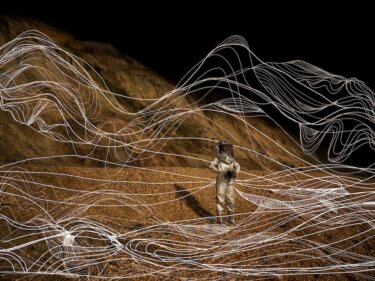Mónica Alcázar-Duarte
Space Nomads

Space Nomads brings ancestral knowledge and the Maya worldview into conversation with Western science, contemplating our violent shared history, while inquiring into possibilities for the future. The four-screen projection interspersed with mirroring elements can be read as a multi-sensorial techno-aesthetic device, enabling a journey into both past and future concomitantly, casting a glace inwards and projecting outwards through the infinity of time.
‘From the ashes we tried to rescue what was left’, a Maya narrator addresses viewers from a distant yet relatable plane. She recalls the violence of colonisation, an encounter of worlds, and the Spanish Franciscan bishop of Yucatán Diego de Landa (1524-1579) ordered the burning of the Maya library of Maní as part of a pushing ‘auto de fe’ ritual. Yet even within destruction, the possibility of life prevails, as represented by the stingless bee Xunan-Kaab (Regal Lady Bee), an endangered species which remains essential to Maya communities from the region. As a bearer of life, the bee returns us to ancestral knowledge, to existence in communion with other living beings, urging us to learn how to live together again. We are not just interconnected but also interdependent.
Multiple temporalities overlap, woven into the non-linear texture of a marvellous installation created especially for this occasion. Ancient astronomical principles and observations merge with contemporary space exploration. As the James Webb Space Telescope travels through space on a mission to uncover the origin of the universe, and of life itself, so we return back to the land and the air, the nature that continues to sustain life on Earth. The project contemplates our future as space nomads on the cusp of environmental decline, edging closer and closer to catastrophe.
Location: Carré Chassé